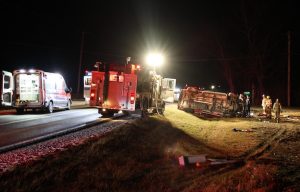Regional Office of Education offers key programs and services
It resides in a modest, one-story brick building across from the Monroe County Courthouse in Waterloo. A plain, white-lettered sign on the glass door reads: “Monroe-Randolph Regional Office of Education.”
Every day, hundreds scurry past its door, walking or driving, and few have any idea what goes on there.
What were originally called County Superintendents of Education when they were established in 1865 – 102 of them in Illinois – have today been consolidated in 45 regional offices, or ROEs. Next year, that number will be reduced to 35.
Their original purpose was to ensure equity of services in public schools. They made sure facilities were comparable and that education was offered on an equal basis.
Today, that mission remains much the same, but it has grown exponentially. An example of this can be found in the office of Regional Superintendent Kelton Davis. On a cabinet in a glass frame sits the Rules for Teachers – 1872. It is a single parchment page. Nearby is the latest book of laws and regulations governing schools – the size of a St. Louis phone book, or larger.
Davis’ responsibility stretches across two counties and includes nine community unit school districts and the state’s last remaining “non-high school district.” The latter is Chester Non-High School District 122, which is responsible for the graduates of Prairie du Rocher grade school.
Davis serves as superintendent of this entity and, along with its school board, makes decisions that best serve those students. One important decision is which high school each student will attend. Currently, students attend Red Bud, Waterloo and the Perandoe Education Program.
The Republic-Times visited the ROE’s Waterloo office recently to learn more about its workings. A satellite office exists in Chester to provide more localized support.
On this visit, we focused on two aspects few people know about. One is the performance of background checks on all persons who come in contact with students – teachers, aides, bus drivers, maintenance personnel, food preparers and administrators. This also includes volunteers who may be in unsupervised contact with students and even construction workers adding onto existing, operating schools.
To perform this mission, the ROE uses a fingerprint connection to the FBI. Individuals can be digitally fingerprinted and the image is transmitted to the FBI for comparison with its database. Results are back within four hours. Background checks can also be run by name.
“I feel like I am in a ‘CSI’ mission sometimes, doing this,” said Darcy Fausz, who manages the backgrounding task, as she described how fingerprints are taken.
“Our equipment is portable as well,” Davis said. “When they got ready to start replacing one of the gyms in Chester, construction workers who could possibly come in unsupervised contact with students during the school day needed background checks.
Rather than having them drive from Chester to Waterloo, we took the equipment there and conducted the necessary background checks.”
Another mission the ROE has taken on is an extensive qualifications testing program that includes the traditional GED test for those who have dropped out of high school to complete qualifications necessary to gain an equivalent proof of education that will enable them to gain better employment or seek higher education.
These tests were previously administered in the county courthouses. Monroe County did this with pencil and paper tests in the old courtroom, but updated requirements no longer allow that. Instead, test takers must be tested now on computers and in secure cubicles.
They must also be observable at all times to ensure proper procedures are being followed.
The Monroe County facility is in a former bookkeeping office, and each testing station is monitored by a camera that is observable on a flat-screen TV in the front office or on individual computers at desks.
Absent the new facilities in Waterloo, people in Monroe County would have to travel to St. Louis or Belleville for their nearest testing facilities. Ironically, the availability of testing is drawing substantial numbers of people from the St. Louis area. Tests are paid for by the takers. Figures for 2015 show substantial growth in testing numbers over 2014, the first year.
Tests offered are in two categories: Pearson Vue and WorkKeys. Pearson Vue Computer Based Tests include GED, teacher licensing, medical personnel and technical program certifications. WorkKeys tests measure basic knowledge of subjects such as math, reading and writing to qualify for advanced training or job placement.
An example is testing to get into the Career Center of Southern Illinois’ Licensed Practical Nursing Program.
After touring the ROE, we asked Davis to identify his most important missions.
“We want to ensure safety in our schools,” he said. “That includes such issues as health and life safety, including fire protection.”
He also issues building and occupancy permits and ensures fire safety, structural integrity, electrical and plumbing safety inspections are conducted on a regular basis. He ensures drills are conducted properly, including fire, shelter in place and, sadly today, even active shooter training.
“We also focus on helping to ensure success in our schools. We are here to help them navigate the bureaucratic waters – to meet new and emerging requirements as well as existing ones. And we are tasked with ensuring compliance with the rules, regulations and laws that govern education. But in addition to ensuring compliance, we deeply want to help schools to meet these requirements,” Davis emphasized.
“Connecting services and programs for education is a goal,” Davis said. “I like to see our mission as a ‘glue’ to connect services, schools, programs and all efforts to provide better education experiences.”
The mention of programs for at-risk students, involvement with the Drug Free Communities program, Supporting The Autism Reality work and the new CEO programs for students interested in gaining hand-on skills in business entrepreneurship and management were quickly ticked off by Davis.
He noted that by statute – ROEs are mentioned in Illinois statutes more than 1,000 times – he is a truancy officer.
“But I am more interested in intervening and preventing truancy than punishing people,” he affirmed.
So, the Republic-Times saw only the tip of an iceberg in its first visit to the Monroe-Randolph ROE. Unlike those impacted by global warming, this one isn’t shrinking.
We have been invited back and will return.






